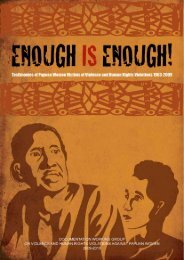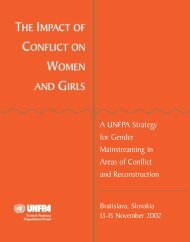Sexual exploitation and abuse by UN peacekeepers - PeaceWomen
Sexual exploitation and abuse by UN peacekeepers - PeaceWomen
Sexual exploitation and abuse by UN peacekeepers - PeaceWomen
Create successful ePaper yourself
Turn your PDF publications into a flip-book with our unique Google optimized e-Paper software.
36<br />
Carlyn van der Mark<br />
Political Science Master Thesis - <strong>Sexual</strong> <strong>exploitation</strong> <strong>and</strong> <strong>UN</strong> <strong>peacekeepers</strong><br />
national authorities. This would allow for a continuation of investigating an allegation with<br />
the possibility of prosecution of such crimes (A/59/710). The report issued <strong>by</strong> the Security<br />
Council after the Zeid Report emphasizes that improved cooperation between the secretariat<br />
<strong>and</strong> troop contributing countries is needed for holding U.N personnel accountable<br />
(A/60/640). However, the difficulty of implementing a zero tolerance policy from a legal<br />
perspective is that U.N does not have the official legal authority to prosecute against U.N<br />
personnel. The U.N can only repatriate personnel who have committed crimes of sexual<br />
<strong>exploitation</strong> <strong>and</strong> <strong>abuse</strong>. The legal jurisdiction is left to the national authorities. This restricts<br />
the implementation of the zero tolerance policy on the behalf of the U.N. Another difficulty<br />
of implementing a zero tolerance policy from a legal perspective is the differences in legal<br />
jurisdiction per U.N personnel.<br />
2.2 Legal status <strong>and</strong> jurisdiction per personnel<br />
One of the difficulties facing the implementation of a zero tolerance policy towards sexual<br />
<strong>exploitation</strong> <strong>and</strong> <strong>abuse</strong> is the legal provisions for different personnel in U.N peacekeeping<br />
missions. For example, a civilian U.N staff who has violated the zero tolerance policy can be<br />
fired <strong>and</strong> sent home (Jennings, 2008, p.20). The United Nations civilian staff are bound <strong>by</strong><br />
the Charter of the United Nations (article 101) (DPKO/MD/03/00996). Civilian staff are<br />
civilians who work with intergovernmental organizations, NGOS, private voluntary<br />
organizations or private companies. Civilian U.N staff do not fall under the same jurisdiction<br />
as military personnel. This means that civilians personnel, unlike military personnel, do not<br />
have immunity for the crimes they may commit while on mission.<br />
In comparison, military members of national contingents are held accountable <strong>by</strong> the criminal<br />
jurisdiction of their own national authorities. This gives them immunity from local criminal<br />
prosecution (DPKO/MD/03/00996). It is important to note that immunity does not justify<br />
impunity. Military personnel, if found to be guilty of neglecting to follow the zero tolerance<br />
policy, should still be prosecuted <strong>by</strong> their own national laws. National authorities are<br />
expected to take appropriate action (DPKO/MD/03/00996). Military members of national<br />
contingents are expected to abide to the Ten Rules: Code of Personal Conduct for Blue<br />
Helmets <strong>and</strong> We are the United Nations Peacekeepers (DPKO/MD/03/00996). If a military<br />
personnel is convicted with allegations of sexual <strong>exploitation</strong> <strong>and</strong> <strong>abuse</strong> then the military<br />
personnel is most likely to be repatriated back to their home country. Repatriation does not<br />
necessarily mean the peacekeeper will be fired or punished (Jennings, 2008, p.20).




![IANSA [PDF, 2MB] - PeaceWomen](https://img.yumpu.com/25206379/1/190x123/iansa-pdf-2mb-peacewomen.jpg?quality=85)
![Commitments Sample [PDF, 93KB] - PeaceWomen](https://img.yumpu.com/25206331/1/190x245/commitments-sample-pdf-93kb-peacewomen.jpg?quality=85)










![A Toolkit for Advocacy and Action [PDF, 260KB] - Peace Women](https://img.yumpu.com/25205989/1/190x245/a-toolkit-for-advocacy-and-action-pdf-260kb-peace-women.jpg?quality=85)